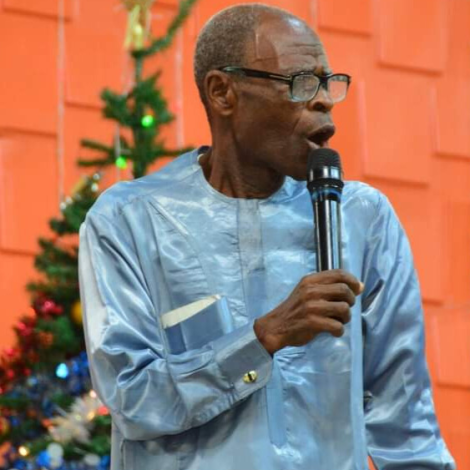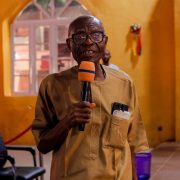The Founder's Story


Family Background
Pastor Dr. E.F. Oyekola was born in 1940 into the family of the Late Akano Adedeji Oyekola. He was born into a family deeply rooted in traditional religion, with his family devoted to the worship of Egungun (masquerades). In his early years, he was enrolled in a Quranic school to study Arabic.
However, his journey took a dramatic spiritual turn following a mysterious illness that defied diagnosis and resisted all medical treatments. He visited the Adeoyo Hospital in Ibadan, then staffed by European medical professionals, and despite receiving injections, there was no improvement in his condition.
He started attending the Aladura church to the annoyance of his parents. His decision to affiliate with the church sparked disapproval and strong resistance from his parents and extended family, none of whom were Christians. They insisted that if he must become a Christian, it should be within more “respectable” denominations like the Baptist or Catholic Church, rather than the Aladura, which they perceived as a congregation full of the uneducated.
Undeterred by their opposition, young Oyekola continued attending the Aladura church. It was during this period, between 1955 and 1956, that he experienced a divine encounter. He was anointed by God and got filled with the Holy Spirit with the evidence of speaking in tongues.
Educational Background
In those days, it was customary for a child to begin school at the age of six, provided the child could raise his right hand over his head to touch his left ear. However, due to his small stature, this was not the case for Baba Oyekola. He began his formal education in 1947 at the age of seven, the same year his father passed away.
He completed his primary education in 1956 at the age of sixteen. Afterwards, he enrolled in Modern School at Apanpa Yemetu for Modern One. Unfortunately, financial constraints hindered his academic progression. In 1958, he traveled to Iwo to live with his uncle, spending the entire year out of school.
He returned home and was meant to repeat Modern Two in 1959. However, in an unexpected twist of fate, he was mistakenly admitted into Modern Three. When he arrived at the school, he unknowingly joined the queue of students seeking admission into Modern Three, and the proprietress, without asking for a transfer certificate or the class preference, instructed that everyone in line be admitted to Modern Three. Fortunately for Baba, he passed the Modern Three examination successfully that year.
Baba aspired to attend Teachers’ Training College but he lacked the necessary funds. So, he bought textbooks and decided to study independently for the General Certificate of Education (GCE) Ordinary Level London. In 1965, he sat for the examination and passed all subjects except English. He made another attempt in 1966 with the same outcome. After several attempts, he eventually passed English along with other subjects, earning two Advanced Level passes and four Ordinary Level passes.
He wanted to pursue a degree course in the university but he was told he was not qualified for a degree course, rather, he was admitted to study for a diploma course. He enrolled for a Diploma in Religious Studies in the University of Ibadan, and upon completing the program, he advanced to a degree course in the same field. Baba graduated with a Bachelor’s degree in Religious Studies in 1979.
In 1980, he proceeded to Obafemi Awolowo University, Ile-Ife, for a Postgraduate Diploma in Education. This laid the foundation for his Master’s degree in Education, which he completed in 1985. Eager to further his academic journey, he gained admission into the University of Ibadan for his doctoral studies. In 1993, Baba Oyekola earned his Doctorate Degree in Education.
Even after earning his doctorate degree in Education, Baba Oyekola’s thirst for knowledge remained unquenched. Twenty years after completing his Ph.D., he decided to return to school to study Law. He enrolled at Lead City University, Ibadan, as one of the pioneer students in the Diploma in Law program. However, he discovered that the Law course had not received full accreditation at that time which made him withdraw.
Undeterred, he gained admission into the National Open University of Nigeria to study French. Yet again, he encountered a roadblock— there were no lecturers because it is an open-distance learning. As a result, Baba made another decisive move.
He enrolled at the University of Ibadan to pursue a Bachelor’s degree in French, embracing the rigors of full-time study once more. During the course of the program, he traveled to Lomé, Togo, for practical French language experience. In 2013, he graduated with a Bachelor’s degree in French.
The Call
After Pst. E. F. Oyekola left primary school in 1956, he enrolled in a modern school in 1957 as his family couldn’t afford secondary education. He was admitted to Awe High School in Oyo but was unable to attend due to lack of funds.
At the time, he was already an active member of a church and was living with a pastor named Baba Dada, of blessed memory. He was already anointed by God and had the gift of dreaming dreams.
That same year, in a dream, God instructed him to go back home and pray for the sick, and this vision was confirmed by Baba Dada. God instructed him to return to his father’s compound and pray for those who were suffering from smallpox.
As he was returning home, he met his mother who asked him where he was going. When he told her he was going home, she warned him not to, explaining that almost everyone at home was ill with smallpox. But he replied that he was going home to pray for the sick.
His mother questioned him, asking when he had become a pastor or prophet, and warned him to be careful. Despite her concern, he went home, prayed for the sick, and blessed water for them to bathe with. By God’s grace, they recovered.
As a result, the people told him, “Brother, stay with us and be praying for us.” He explained he could not come every day, so they agreed on Thursdays for him to return and pray with them. Gradually, the number of people attending the fellowship grew. Eventually, the Mogaji (family head) of the compound said the gathering had become too noisy and suggested they move to the front of a nearby building to construct a church. That marked the beginning of the church, which began to grow steadily.
In 1973, he received a vision in which God told him to leave his father’s compound and go to a place He would show him. Though he had never been to Oluwo-nla village before, he was familiar with Bashorun, an area where they always bought firewood. God instructed him to ask for a village beside Bashorun.
He found his way to Oluwo-nla village and the villagers asked him what he wanted. He told them he wanted to establish a church and live there. They welcomed him, and that same year, the church was established under the name CAC Oluwo. Initially, he rented a small room to serve as the church, scrubbing the floor with cow dung. Eventually, he was able to purchase a piece of land, which became the permanent site of the church.
Though he had been praying for expansion at the original site in his father’s compound at Oyekola, Oje, God did not provide land there. Instead, He answered the prayer by granting land in Oluwo-nla, Bashorun where the ministry continued to grow.


